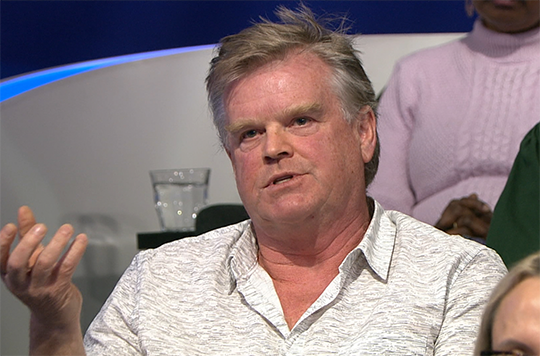Dr Eric Brymer is one of the experts who featured in Risk and Reward episode of SBS television’s Insight program.
Photo: SBS Insight.
Tossing up and then largely dismissing such terms as adrenaline junkie, thrill seeker and undue risk taker, Southern Cross University psychologist Dr Eric Brymer, believes because the real motivations of people pursuing “extreme sports” don’t conform to our perceptions.
Dr Brymer is no stranger to those people who leap off mountains, surf outsized waves, jump out of planes or free-dive to unbelievable depths.
Working out of SCU’s Gold Coast campus, Dr Brymer, the new course coordinator of the Bachelor of Psychological Science with Honours program, shared his expertise with a national audience on SBS television’s Insight program in an episode titled “Risk and Reward”. The show aired on Tuesday June 21.
‘The popular conception for extreme sports participation is risking one’s life and chasing the adrenalin rush,’ Dr Brymer said.
‘However, it’s much more nuanced and complex. The overwhelming majority of participants are very careful, calculated and knowledgeable about what they do. One person I know says it’s riskier to be driving his car at the mercy of other drivers than it is to do activities he does.
‘Why they keep going back for more is not about risk-taking. Instead, participants report deep inner transformations that influence world views and meaningfulness, feelings of coming home and authentic integration as well as a freedom beyond the everyday.
‘The single focus required in the moment to start and complete the activity safely, taking account of the surrounding environment, is like a meditation, a dance with nature. You’re attuned to the environment to such an extent that you’re floating through it.
‘Participants report these moments as being transcendent of time, space and body. Extreme sport participation points to a more potent, life-enhancing endeavour.
‘I know a 79-year-old base jumper! Calculated adventure activities in the natural environment have benefits for all of us.’
Dr Brymer, co-author of the book Phenomenology and the Extreme Sport Experience (2017), is an internationally recognised adventure psychologist and researcher specialising in understanding and developing high performance skills and wellbeing outcomes. He has a particular interest in the human-environment relationship and the impact of this relationship on performance.
‘When I first started researching this phenomenon, there was no understanding of adventure athletes or extreme athletes,’ Dr Brymer said.
‘Society dismissed them as thrill-seeking personalities, danger-seeking risk takers. I knew it didn’t reflect my experience. The people I worked with and coached were very careful, very skilled, very committed. None of the literature at that time reflected the people I knew or worked with.
‘Extreme athletes know they can’t conquer the natural world. The natural world doesn’t know you’re there! Mount Everest doesn’t know you’re on it… Same with big waves, the waves don’t know you’re on it, they just do their thing.
‘At the heart of these activities is challenging the self, about awakening our perceptions. There is a sense of freedom and clarity when our perceptual capacities are awoken to their full capacity. Travelling at a few hundred kilometres an hour, these people’s visual acuity is heightened so they see the detail in the rocks, the waves, the colours, the shades, the nooks, the crannies.
‘I believe modern living, with its removal of us from the natural environment, has dulled our senses, to the detriment of our mental wellbeing.’
















